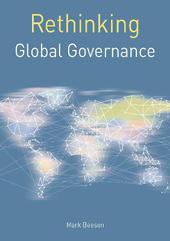
|
Rethinking Global Governance
Hardback
Main Details
| Title |
Rethinking Global Governance
|
| Authors and Contributors |
By (author) Mark Beeson
|
| Series | Rethinking World Politics |
|---|
| Physical Properties |
| Format:Hardback | | Pages:254 | | Dimensions(mm): Height 210,Width 148 |
|
| ISBN/Barcode |
9781137588616
|
| Classifications | Dewey:320.4 |
|---|
| Audience | | Undergraduate | | Postgraduate, Research & Scholarly | |
|---|
|
Publishing Details |
| Publisher |
Bloomsbury Publishing PLC
|
| Imprint |
Red Globe Press
|
| Publication Date |
7 March 2019 |
| Publication Country |
United Kingdom
|
Description
The world currently faces a number of challenges that no single country can solve. Whether it is managing a crisis-prone global economy, maintaining peace and stability, or trying to do something about climate change, there are some problems that necessitate collective action on the part of states and other actors. Global governance would seem functionally necessary and normatively desirable, but it is proving increasingly difficult to provide. This accessible introduction to, and analysis of, contemporary global governance explains what it is and the obstacles to its realization. Paying particular attention to the possible decline of American influence and the rise of China and a number of other actors, Mark Beeson explains why cooperation is proving difficult, despite its obvious need and desirability. This is an essential text for undergraduate and postgraduate students studying global governance or international organizations, and is also important reading for those working on political economy, international development and globalization.
Author Biography
Mark Beeson is Professor of International Politics at the University of Western Australia. Before re-joining UWA in 2015, he taught at Murdoch, Griffith, Queensland, York (UK) and Birmingham, where he was also head of department. His work is centred on the politics, economics and security of the broadly conceived Asia-Pacific region. He is the author or editor of 19 books, including Regionalism and Globalization in East Asia: Politics, Security and Economic Development and China's Regional Relations: Evolving Foreign Policy Dynamics, co-authored with Fujian Li. He is currently the Research Chair of the Australian Institute of International Affairs.
ReviewsIn an increasingly uncertain global environment, with the rise of populism and the return of geopolitics, Beeson's Rethinking Global Governance offers a refreshingly balanced and richly-informed assessment of the state of international cooperation as well as the prospects for world order. This book will be of considerable interest to scholars and policymakers alike. * Amitav Acharya, American University, USA * Given its fast-changing character, global governance always needs to be reconsidered. At last we have a book that re-engages with globalisation and makes sense of its multi-faceted impact on states and society. Theoretically informed and cogently written, Mark Beeson does more than re-think global governance, he makes dramatically obvious the political and economic consequences that we all will bear without a reformed and revitalised global governance. * Diane Stone, Centenary Professor, University of Canberra, Australia; University of Warwick, UK * If you are looking forward to better governance on key global issues, from security to economic governance to climate change, don't hold your breath. If you want to better understand the huge challenges confronting such endeavours, read this book. Mark Beeson intelligently, and in a highly readable fashion, reviews a large literature and ponders the fraught nature of global governance in a world where the major powers in the US, China and Europe increasingly appear to be working at cross-purposes. * Stephen Bell, University of Queensland, Australia * Global change is coming, but not just from the top down or the outside in. While "global governance" usually refers to international organisations, regulatory complexes, transnational economic processes and the spread of globalising socio-political norms, Mark Beeson develops a broader, more multidimensional geopolitical framework, focusing on the systemic interaction of nation-states, non-state actors-including the private sector and non-governmental organisations-domestic politics and policy entrepreneurs in an evolving, interdependent world. * Philip G. Cerny, University of Manchester, UK *
|